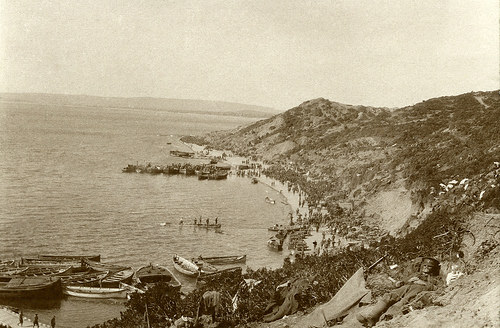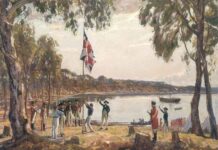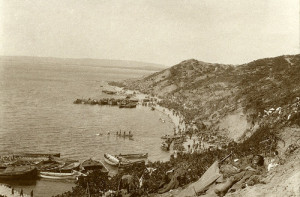
Gallipoli, as my XYZ colleague Boethius argued recently, is rightly seen as the birthplace of the nation of Australia. Along with our fellow ANZACS the New Zealanders, and the Great Powers Britain and France, our grand parents, great-grand parents and great-great-grand parents fought bravely and skilfully. But there is no shame in admitting that we were beaten. The campaign failed in its objective to capture the Gallipoli Peninsula, and gain control of the Dardanelles Strait.
But imagine if it hadn’t. The game of what-if history can risk trivialising history, in order to show off the academic knowledge of those who play it. But on the contrary, I want to play this game to demonstrate the importance of the Battle of Gallipoli and why the expedition was attempted, highlight how important it was that we were there, and provide an insight into the moral malaise we see from our present leadership in the West. Winston Churchill himself made the case that to go back in history and change one event would lead to a whole series of changes…
The Ottoman Empire
Let us imagine that the British warships which had been promised to the ANZAC’s had arrived at the right place at the right time on the morning of April 15, 1915, and had provided vital artillery support to the the attackers of ANZAC Cove. Imagine if this competent, coordinated support had allowed the ANZAC’s to break through the Turkish lines, that this success had been replicated across the entire front held by the Entente, and that, as in the the Greek-Turkish War of 1919-22, rapid advances were made across the Turkish landscape and the Gallipoli Peninsula was captured. This success snowballs into the capture and control of the the Dardanelles Strait, the capture of what was still at that time, the capital of Constantinople, sorry, (not sorry,) Istanbul, and the defeat and collapse of the entire Ottoman Empire in 1916, rather than 1918-20.
(Such a scenario is indeed a big stretch, but let us entertain it in order to examine what was at stake.)
The Ottoman Empire was known as the “sick man of Europe” long before its demise at the end of WW1, but what was actually the foreign intruder into Europe was actually the existential threat to European Christendom barely a few centuries before, as had been the other caliphates before it. At the Ottoman’s peak it had controlled most of Eastern Europe, and it besieged Vienna in 1529 and 1683 – if either of these sieges had succeeded, it would have had the same effect on Europe as the ultimate capture of Constantinople, after a series of sieges over the course of centuries, had on what we now call Turkey – Europe would already be part of a caliphate in one form or another, and its demographic make-up would be well on the way to becoming overwhelmingly muslim.
Australians should take pride in defeating what had been hoped would be the last of the caliphates in 1918, for their role in the victory of Beersheba, and their role in being among first Western troops to enter Jerusalem, victorious, for nearly a millennium. But had we succeeded in the Battle of Gallipoli, it is possible, (with a lot of luck,) that we could have knocked out the Ottoman Empire then and there.
Russia
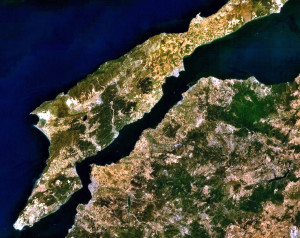
The early defeat of the Ottoman Empire, and its early exit from the war, is crucial in considering what could have come next. The whole reason for our being in Gallipoli, the reason why the Dardanelles were such a strategically vital location, was that they represented the only practical way the Western Allies could reinforce its struggling Entente ally in the Russian Empire. It was difficult to supply Russia through its Baltic Sea ports as they were frozen over for the winter, and the narrow straights made cargo easy prey. If Britain had been able to supply it via the Black Sea, it could have done so, safely, all year round.
It is conceivable that had the Entente captured the Dardanelles, and knocked the Ottomans out of the war, they would have been able to supply both weapons, food, and soldiers to to what turned out to be a hopelessly ill-equipped, badly led and ill-disciplined Russian army. Rather than the Russian Front of WW1 being a succession of slaughters by the German army over the Russian army, it could have been as exhaustive for Germans as the Western Front. If all had gone well, the communist revolutions which knocked Russia out of the war may have been squashed before they had a chance to develop.
Thus, the USSR may never have come into existence. The purges, the famines, the Cold War, the subjugation of Eastern Europe, the nuclear arms race, the Chinese Revolution, the Korean and Vietnam wars, the killing fields of Cambodia, the Cuban Missile Crisis, and civil wars and terrorist attacks all throughout the third world, may never, ever have happened. The 100-200 million people who died at the hands of communism during the Twentieth Century could have lived, or at least, more of them could have lived. Democracy and the free market could have had a chance to enrich much of the world, rather than the economic stagnation, starvation, and slavery which it endured under communism.
Germany
The early exit of the Ottoman Empire, and an effective Russian front, could have also allowed the Entente to defeat an ailing Austro-Hungarian Empire. The opening of this third front could have meant that Germany was surrounded on all sides, as it was at the end of World War 2. It is possible, even with the near futility of trench warfare, that the Allies could have broken through, invaded Germany, and defeated it totally, some time in 1916 or 1917.
This could have been crucial from a number of perspectives for Germany in the coming decades. One argument made for why the Germans were prepared to go to war again a couple of decades after their defeat in 1918 was that they did not feel beaten. They felt betrayed. The people of Germany had not been made to feel like they had nothing left to give, because the fighting, and the surrender, all occurred on foreign soil. Had Germany been invaded, and defeated, or even if it had surrendered when it realised it was surrounded on all sides and its people realised that the situation was truly, utterly hopeless, then their mindset at the end of the war could have been altered, to be more acquiescing of the defeat, as they were at the end of World War Two.
A victorious Entente in 1916 or 1917 may not have felt compelled to punish a defeated Germany so severely, feeling perhaps that they could allow it to recover economically and militarily, given that they had defeated it so unequivocally. These factors could have rendered the rise of Adolf Hitler and the national socialists impossible, thus avoiding the horrors or World War Two, the racism inherent in the national socialist philosophy, and the Holocaust to which it led.
Germans would not feel the existential national guilt which afflicts them today, and has left them utterly defenceless when faced with an actual existential threat to their existence. White people of European heritage in general, and Germans in particular, would not be able to be “Godwin’s Lawed out of existence” by a socialist intellectual elite who portray any moment of pride in European heritage as the first step to racism and genocide.
Futility of War
But with or without the rise of Hitler, had Germany been utterly defeated, or been forced in to an early, desperate surrender in 1916 or 1917, World War 2 would most likely never have occurred. To explain why I think this is so, I need to discuss why World War 1 was so devastating to the Western psyche.
The battles of World War One, although commemorated for the bravery of our forebears, the values for which they fought, and the ultimate, desperate victory which they won, are often seen as a terrible, useless waste, a waste of human life. Indeed they were, as all war ultimately is, but the battles can be viewed as some of the most pointless in history because a technology – the machine gun – had developed which irrevocably changed one key aspect in the way warfare was carried out, a way, despite technological improvements, which had remained unchanged for millennia.
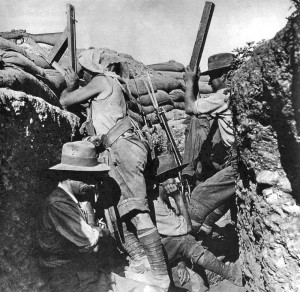
The machine gun’s ability to cut mercilessly through masses of men made cavalry instantly, suicidally obsolete, as it did to the tactic of massing men together, in formation, on an open field. The only thing which could stop a machine gun’s bullets was the earth itself, so men dug a network of trenches which stretched practically the length of the French/Belgian and French/German border. For the few short years that it took to develop an effective counter to the machine gun, in the form of the army tank, they only option generals faced in trying to advance and capture territory from the enemy, was to order their men to leave the relative safety of their trenches and throw themselves in great enough numbers at the machine guns, supported, admittedly, by artillery fire, in the futile hope that there would be enough of them left to make it to the other side and capture the enemy’s trenches.
It was this diabolical calculation which made the battles of World War One so devastating and so futile, the reason why 60 000 men could be lost in an hour, such as at the Somme. And it was this diabolical calculation which scarred the collective mindset of the Western democracies, from their leaders, through their generals, to the intellectuals, down to the ordinary voter, and made them so reluctant to stand up militarily to the next threat which faced them, in the form of Adolf Hitler, during the 1930’s until it was too late, and an even greater human slaughter resulted.
Ironically, we tend to view the battles of World War Two as more important, more prescient, because they were of more value – armies were more mobile, because the technology – army tanks and ground attack aircraft – and the tactics – blitzkrieg and pincer movements, in turn made trench warfare obsolete. Armies could once again capture large tracts of land very quickly, once the defensive imbalance caused by the development of the machine gun was overcome by what effectively was the breakthrough of making artillery both mobile and defendable.
Thus the battles of World War Two, with no disrespect to those who fought and died in World War One, meant something. They were existential. Defeat meant the subjugation of nations, victory meant the relief and jubilation of national and personal survival. So it is ironic that the foundation for this return to mobile, and thus effective warfare, was laid during the last years of World War One, when the first unreliable tanks and flimsy aircraft helped turn the balance back into the favour of the attacker, but the psychological and moral damage, the damage which turned on its head the West’s will to fight, was done in the first couple.
Historians correctly analyse how the seeds for World War Two were sown at the Treaty of Versailles, when the reparations inflicted on defeated Germany made it virtually impossible for it to get back on its feet, and facilitated the rise of Adolf Hitler, or someone like him, to propel the Germans back to war. But one can argue that this is looking at things the wrong way. When we look at history, we see that a new threat always, almost inevitably, emerges. What matters is the will, the moral courage, to stand up to these threats, and face them in political battle at all costs, and military battle if necessary. The futility of the warfare in the first years of World War One stripped the leaders of the the Western democracies of this will, or this moral courage, to stand up to Hitler when he was still weak, making the physical courage necessary to eventually defeat Nazi Germany inevitable.
End of the Enlightenment
The loss of the will to fight, in the belief that war could lead to realistic political ends, was accompanied by a loss in the belief in Western, European, Christian civilisation itself, at least in Europe. Encouraged by the Cultural Marxists whose agenda was the collectivisation of the entire world, the World Wars were seen as the inevitable result of the European Enlightenment itself. Thus the intellectual and moral foundations of Europe were dealt a near fatal blow during World War 1. The same lack of moral courage which led to the rise of Hitler’s Nazi Germany and the calamity of World War 2 is the same lack of moral courage which refuses today to stand up with full force to a reemerging Caliphate.
Cultural Marxism’s first victory was the reluctance to stand up to Hitler. Had World War One not been so devastating, Cultural Marxism would still exist, but it would not have been able to make a dent in the first place had not the will to fight, and the belief in the rightness of Western civilisation and the Enlightenment principles on which it was built, been so devastated by the calamity of World War One. Instead, although Europe has developed over the preceding century into the prosperous, thriving continent that we still see today, it has been hollowed out intellectually and morally, a process which may soon yield horrific results.
The disaster of Gallipoli
It is pleasing that we focus here in Australia, not just on Gallipoli, but on other theatres of war in which our diggers have fought, such as the Western Front and Middle East in World War 1, the Battle of Britain and the subsequent bombing campaign of Germany in World War 2, Alamein, Singapore, Kokoda, Korea, Vietnam, East Timor and the modern Middle East to name scandalously few. But the pivotal nature of the Gallipoli campaign cannot be understated.
Had it succeeded, the entire course of the Twentieth Century could have been altered. (It must be stressed, as I said at the start of this article, that this is a big stretch. It involves multiple assumptions, and multiple assumptions follow these initial assumptions. But my intention is to demonstrate why the campaign was important, and the ailment which has steadily afflicted the West since.)
We in Australia have been blessed to live in a country which has thwarted invasion, and never had to live the horrors of subjugation. Although we remember the battles of the World Wars and the Cold War with sadness, we also have joy because they represent the ongoing fight for our freedom which we have been able to preserve throughout.
The same cannot be said for most of the world. Whether at the hands of a foreign invader, or at the hands of one’s own totalitarian government, life for billions of people throughout the world in the Twentieth Century was characterised by slavery and death. Had the Battle of Gallipoli succeeded, the chain of events which followed may have altered all of this, forever.
Therefore, it can be argued that the Battle of Gallipoli, and the defeat of the Entente it entailed, was the greatest disaster of the Twentieth Century. It is a defeat as significant as the fall of Rome and the fall of Constantinople, because of the death and suffering which could have been avoided had we succeeded.
It is for this reason that it is imperative that we continue to remember Gallipoli, not only for its foundational role in the birth of our nation, and for the symbolism of the battle – the fact that we were there at a moment in history when the attempt to spread the freedom and prosperity which we enjoy was thwarted, but it is a battle which we continue to this day.

